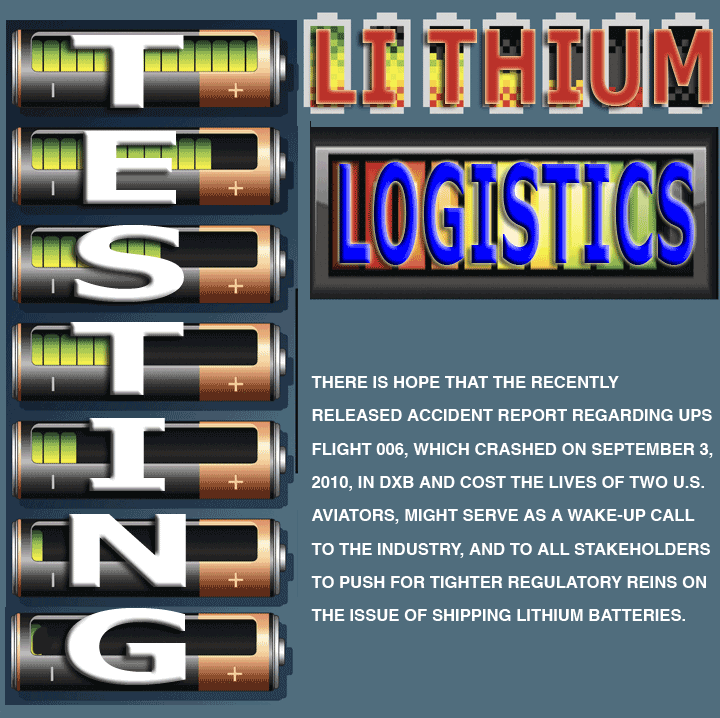| 
There is hope that the recently released
accident report regarding UPS flight 006, which crashed on September 3rd,
2010, in DXB and cost the lives of two U.S. aviators, might serve as a
wake-up call to the industry, and to all Stakeholders to push for tighter
regulatory reins on the issue of shipping lithium batteries.
In all fairness it must be said that by
and large both the regulatory authorities have failed to address the surge
in retail shipping and reverse logistics involving consumers and sparked
by Internet-based distribution in recent years.
The exception is the recently introduced
ANPRM HM-253 by US-PHMSA and the liberalization of DG within UK domestic
mail.

However, shippers have failed to implement
existing standards and logistic providers have decided to turn a blind
eye to what they know about the merchandise to be shipped.
Sure enough, any retail merchandise shipper
striving for full compliance with existing national and international
dangerous goods requirements would find himself at a considerable commercial
disadvantage which would, more likely than not, put them out of business
soon, meaning this is mainly a regulatory issue that should be addressed
by industry outreach programs, education, training, and, last but not
least, enforcement.

Firstly, have you heard about reBuy?
In Germany you can sell off your electronic
gadget, or you can buy a semi-new gadget online via reBuy for less than
it costs new.
Still, the issue is that shipping (both
from reBuy to you, and also when you ship merchandise back to reBuy) must
be in compliance with dangerous goods requirements.
That, however, is usually not the case.
When selling gadgets to reBuy, you go through
an identification and self-appraisal process of your used gadget on their
website, at the end of which you’re given a preliminary purchase
price.
If you agree, you can print the shipping
labels and get the parcel picked up either at your home or business address
or drop it off at any German post office or Hermes Logistics Depot.
However, although reBuy has an extensive
FAQ section on their website, the search terms “Dangerous Goods”
or “Lithium Batteries” yield no results.
There is not even the basic advice to protect
gadgets against accidental activation, protect loose batteries against
short circuits, or avoid shipping obviously malfunctioning batteries.

The simple truth is that owing to PRBA’s
successful initiatives at removing regulatory burdens in commerce, most
gadgets shipped do not require bearing the so-called “Lithium –
Battery Handling Label” or any indicator on the shipping documents,
as long as there are no more than four cells or two batteries of the “excepted”
type (batteries 100Wh or less, cells 20Wh or less) contained within the
gadget.
It seems to be largely ignored that they
must still conform to the so-called “General Requirements”
(which are all based on the “UN Model Regulations” in the
current 17th Edition) under all international and European modal regulations;
also, for the U.S., 49 CFR has to a great extent been harmonized with
the UN Model Regulations.

General Requirements” (which are all
based on the “UN Model Regulations” in the current 17th Edition)
under all international and European modal regulations:
The following requirements apply to all
lithium ion or lithium polymer cells and batteries:
(a) each cell
and battery is of the type proven to meet the requirements of each test
in the UN Manual of Tests and Criteria, Part III, subsection 38.3.
(b) However,
batteries and cells manufactured before 1 January 2014 conforming to a
design type tested according to the requirements of the 5th revised edition
of the UN Manual of Tests and Criteria, Part III, subsection 38.3 may
continue to be transported;
Note: Batteries, including those that have
been refurbished or otherwise altered, are subject to these tests irrespective
of whether the cells of which they are composed have been so tested.
(c) cells
and batteries must be manufactured under a quality management program
as described in 3.9.2.6(e);
(d) cells
and batteries identified by the manufacturer as being defective for safety
reasons, or that have been damaged, that have the potential of producing
a dangerous evolution of heat, fire, or short circuit are forbidden for
transport (e.g. those being returned to the manufacturer for safety reasons).
(e) waste
lithium batteries and lithium batteries being shipped for recycling or
disposal are forbidden from air transport unless approved by the appropriate
national authority of the State of origin and the State of the operator;
(f) cells
and batteries must be protected so as to prevent short circuits. This
includes protection against contact with conductive materials within the
same packaging that could lead to a short circuit.
Where a gadget or other device is shipped with the battery not installed
but contained in the same outer packaging, the “Lithium Battery
handling label” is always mandated.

Now how does all of this work in practice?
From a consumer’s point of view, it
works just fine. From a regulatory point of view, it couldn’t be
worse.

To test all of this out in real time and
regular practice, FlyingTypers Germany ordered a Samsung
Galaxy IV mobile phone from reBuy that arrived active (on) when received.
No instructions in regard to dangerous goods related requirements were
made available in case of reshipping.
We then tried eBay and ordered a Blackberry
Bold 9700 Li-Ion battery and a Samsung Galaxy IV Li-Ion battery from two
different professional sellers. In both cases the devices arrived via
eBay in simple envelopes bearing stamps, which means first, the required
sturdy outer packaging was not supplied for the shipment as required,
secondly, the mandatory Lithium – Battery handling label was missing
(always required when batteries are shipped as such) and thirdly, the
shipping of Lithium batteries by mail is not permitted in Germany.

Do not assume the above are exceptions to
the rule.
There are hundreds of professional sellers
for these commodities, and most of them offer “free shipping by
German post,” both nationally and internationally.
Also, do not assume this is a German problem.
It’s definitely not. As said above, very few regulators have tackled
this issue, and even in the U.S. regulatory guidance addressing these
issues is still in the stage of an ANPRM.
As for shipping any form of Lithium battery
by airmail, the shipping of batteries “as is” is always illegal,
to say it clearly. Not being in compliance would sure sound better, but
given the present regulatory framework, it’s just plain illegal,
period.
Shipping so-called “excepted”
batteries installed in consumer electronics in the mail is possible only
where all the postal organizations involved in such transport have gotten
authorization from their respective national competent authorities. This
means that shipping such items domestically within the U.S. is legal,
or shipping it from Hongkong directly to the U.S. is legal, but neither
from the U.S. to Germany nor from Hongkong to Germany, since DPWN –
Deutsche Post neither holds such approval nor have they applied for it.
Since within Europe, regulations aiming
at international trade and transport tend to be harmonized (for road transport
the ADR framework must be applied while rail falls under RID and inland
waterway under the ADN), it is fair to say that this problem exists in
most EC states where unspecific regulations permit otherwise. However,
such specific regulation—as in the UK—can address domestic
shipping only.
This means a UK citizen may use the UK’s
Royal Mail to ship certain DG items domestically in compliance, but the
very same items may not be shipped to other European (or non-European)
states.
This somehow contradicts the idea of free
trade and borderless provision of services within Europe, but non-enforcement
of existing regulations can hardly be the answer.

Some professional sellers seem to make a
good living by selling used car spares, namely steering wheels with airbags.
While the verbiage employed on their eBay
sites suggest they’ve at least heard about dangerous goods (“all
return shipments must be made using the original performance-tested packaging
materials”) they’re utterly on the wrong track.
Where professional sellers specialize in
the sales of certain commodities, such as paint-related products, cellphone
batteries, or car spares and have ratings in excess of several thousands,
sometimes hundreds of thousands, this can hardly be seen as an exception
but rather as willful non-compliance as a business model:
First of all, airbags contain explosives
and in Germany are subject to Paragraph 20 of the German Explosives Act,
which requires personnel background checks and subject matter training
for anyone handling or using explosives.
Second, DG training would be required for
any shipper or re-shipper of such merchandise, and a performance tested
packaging, once opened, is usually unfit for re-use—it definitely
is where an outer fibreboard box had been used since these are not reusable
as a means of dangerous packaging by definition.
Since DG classification of explosives also
depends on packaging, any modification or reuse of packaging materials
will result in something the authorities will see as illegal handling
of explosives, which may make your new bargain steering wheel way more
expensive than you anticipated.

Sulphuric Acid (Battery Acid), Ammonium
Nitrate-based fertilizer (the stuff which, together with engine oil, makes
an explosive stronger than TNT and was used by Timothy McVeigh in the
Oklahoma City bombing in 1995), disposable lighters, lighter refills—anything
which, according to subsection 2.2 of the IATA Dangerous Goods Regulations,
should trigger a “potential hidden dangerous goods” inquiry—can
be conveniently found on eBay.
In Germany most auctions from professional
sellers come with that handy DPWN/DHL app which calculates your shipping
costs. Hard to believe, then, that logistics providers really have no
knowledge about the dangerous nature of the merchandise being transported
moving through their channels.

Still, there is the proverbial silver lining
on the horizon. Speaking of consumer electronics, a big problem are gadgets
which do not allow the removal of the battery, since this basically renders
illegal any transport of a non-functioning device for the purpose of repair.
Just recently a large manufacturer of such devices has decided to contract
with a compliance provider to obtain the required special permits to transport
such “defective” items within certain European states, so
obviously, the industry is catching on slowly but steadily.
On the other hand, a European manufacturer
of large Lithium – Ion batteries (~ 2.5 kWh) was unable to provide
a test certificate when asked to produce such documentation by a competent
European authority. It turned out that they had tested the cells only,
but not the batteries, so think twice before pointing fingers at shippers
whose cargoes with Lithium batteries got investigated in the UPS006 crash.

So what does German law have to say?
Paragraph 328 of the German penal code reads:
“Prison up to five years or monetary
fines will be imposed where a person, under gross violation of administrative
duties, engages in the transport, shipping, packing, unpacking, loading,
or unloading or receiving of dangerous goods or makes such dangerous goods
available to others and by such action endangers another person’s
health, animals not belonging to him or someone else’s possessions
of not insignificant value.”
According to the law, even an attempt is
punishable.
In the case where an offender is acting
in negligence, the sentence is up to three years of incarceration or monetary
fine.

The way we see things, since everybody has
a stake in ensuring that no more airplanes are brought down because of
mishandled lithium batteries, getting the word out and forging alliances
with industry, government, and all stakeholders—including manufacturers—is
job one from now on.
FlyingTypers thinks DG needs to
position itself front and center as these issues are discussed and brought
into sharp focus at every industry event.
We have learned quite a bit about the way
things work just by shipping some electronics to ourselves.
That experience was a real eye opener.
Just imagine what we can do to advance better
understanding of safer DG shipping practices if we worked together.
Geoffrey/Jens
|






